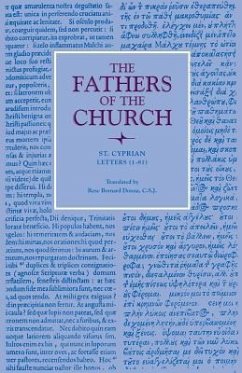St. Cyprian works fall naturally into two groups: treaties (sermons, libelli, tractus) and letters (epistulae). A translation of the treatises will be found in volume 36 of this series. The letters, of which eighty-one have come down to us, written from c.249 until his death in 258 A.D., may be found translated in this volume. They give a penetrating insight into the affairs of the Church in Africa in the middle of the third century. They reveal problems of doctrine and of discipline which had to be decided in a period of crisis and persecution when the Church, still in its infancy, had not yet emerged from the catacombs. Most important of all, they make Cyprian vividly alive as an understanding bishop who could be both gentle and firm, enthusiastic and moderate. He was prudent enough to go into exile to direct his flock from afar when his presence was a potential source of danger to the people; he was courageous enough to face martyrdom that he knew would ultimately he his. Of these letters, fifty-nine were written by Cyprian himself and six more, emanating from Carthaginian Councils or Synods, were largely his work also. Sixteen letters were written by others; apparently eleven were lost. St. Cyprian's prestige and influence was great in Christian antiquity. Unfortunately, he is not well known or as widely read in modern times as he deserves. This is probably due to Cyprian's lack of complete orthodoxy, in the modern sense of the word, regarding the recognition of the See of Peter and the rebaptism of heretics. The modern reader must bear in mind that the period of the Fathers was the time of the laying of the foundation of so much which we accept and see so clearly today. In any case, both Lactantius (Div. Inst. 5.1.24) and St. Augustine (De bapt. contra Donatistas), while acknowledging the weaknesses of St. Cyprian's stand on the questions mentioned, do not in the slightest detract from their respect and admiration for their fellow countryman. Prudentius pays St. Cyprian the following tribute in his Peristephanon 13.5.6 ff.): 'As long as Christ will allow the race of men / to exist and the world to flourish, / As long as any book will be, as long as there / Will be holy collections of literary works, / Everyone who loves Christ will read you, O / Cyprian, will learn your teachings.'
Hinweis: Dieser Artikel kann nur an eine deutsche Lieferadresse ausgeliefert werden.
Hinweis: Dieser Artikel kann nur an eine deutsche Lieferadresse ausgeliefert werden.








